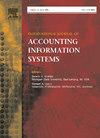了解网络安全漏洞的传染效应:损失启发式和内部控制的作用
IF 6
3区 管理学
Q2 BUSINESS
International Journal of Accounting Information Systems
Pub Date : 2024-09-26
DOI:10.1016/j.accinf.2024.100714
引用次数: 0
摘要
在本研究中,我们试图就先前研究中关于网络安全漏洞的后果是否会波及同行业中未受漏洞影响的旁观企业这一相互矛盾的结论提供见解,这种现象被称为传染效应。在考虑网络安全漏洞对旁观企业的影响时,我们认为投资者会依赖于损失启发式,从而认为亏损(盈利)的旁观企业在未来遭遇类似漏洞的可能性更大(更小)。这将导致亏损企业的网络安全漏洞传染效应大于盈利企业。此外,我们还提出,内部控制质量将减轻传染效应,并且对亏损企业的影响程度要大于对盈利企业的影响程度。为了验证我们的假设,我们使用了网络安全漏洞样本,并确定了与漏洞企业同属一个子行业的非漏洞旁观企业样本。我们的研究结果支持我们的预测,并有助于解释有关网络安全漏洞传染效应的研究结果的混杂性。对于正在考虑如何最大限度降低与传染效应相关的成本的董事会和公司管理层来说,研究结果也应具有参考价值。本文章由计算机程序翻译,如有差异,请以英文原文为准。
Understanding cybersecurity breach contagion effects: The role of the loss heuristic and internal controls
In this study, we seek to provide insights into the conflicting findings from prior research about whether the consequences of a cybersecurity breach spillover to non-breached bystander firms in the same industry − a phenomenon known as contagion effects. When considering the implications of a breach for a bystander firm, we suggest investors will rely on the loss heuristic and thus view loss (profit) bystander firms as more (less) likely to suffer a similar breach in the future. This will lead to greater cybersecurity breach contagion effects for loss firms than for profit firms. Furthermore, we propose that internal control quality will mitigate contagion effects and to a greater extent for loss firms than for profit firms. To test our hypotheses, we use a sample of cybersecurity breaches and identify a sample of non-breached bystander firms in the same subindustry as the breached firms. Our findings support our predictions and help explain the mixed findings from research on cybersecurity breach contagion effects. Results should also be informative to boards of directors and firm management considering ways to minimize costs associated with contagion effects.
求助全文
通过发布文献求助,成功后即可免费获取论文全文。
去求助
来源期刊
CiteScore
9.00
自引率
6.50%
发文量
23
期刊介绍:
The International Journal of Accounting Information Systems will publish thoughtful, well developed articles that examine the rapidly evolving relationship between accounting and information technology. Articles may range from empirical to analytical, from practice-based to the development of new techniques, but must be related to problems facing the integration of accounting and information technology. The journal will address (but will not limit itself to) the following specific issues: control and auditability of information systems; management of information technology; artificial intelligence research in accounting; development issues in accounting and information systems; human factors issues related to information technology; development of theories related to information technology; methodological issues in information technology research; information systems validation; human–computer interaction research in accounting information systems. The journal welcomes and encourages articles from both practitioners and academicians.

 求助内容:
求助内容: 应助结果提醒方式:
应助结果提醒方式:


